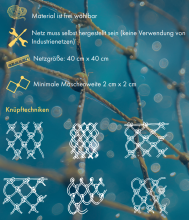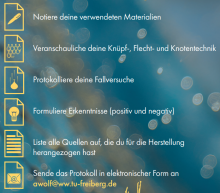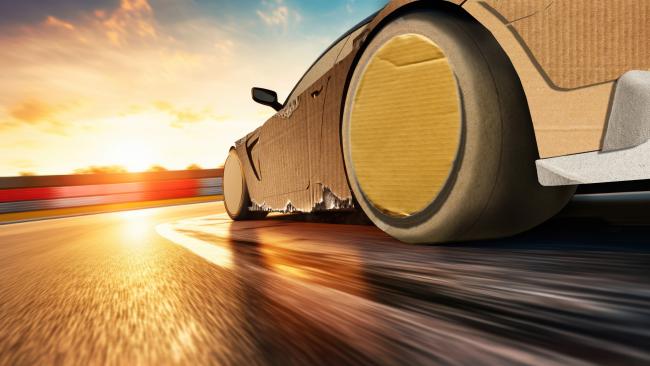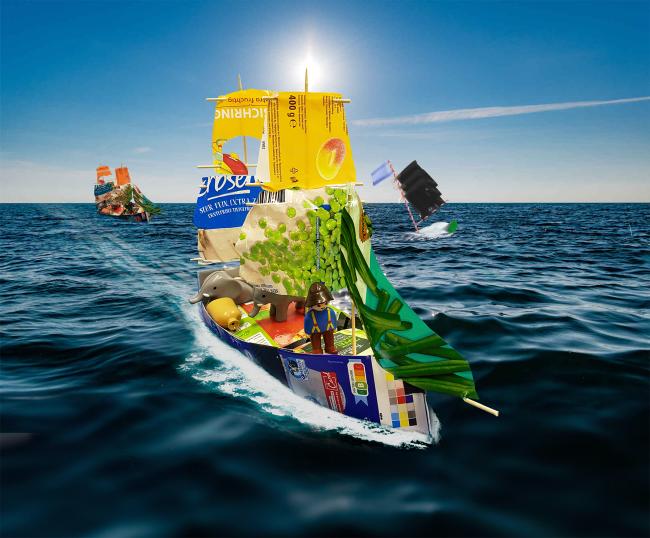SAFETY NET CONTEST - CATCH THE SPLASH
He who catches safely, wins
Nets are one of the most fascinating inventions in human history. They were already used in early cultures - to catch fish, as protection against falling, for transport or as an aid in agriculture and crafts. At the heart of it all is the same, inconspicuous idea: individual, weak threads are linked together to form a resilient structure. Stability is created from flexibility and a load-bearing net from lightness. These principles have lost none of their relevance to this day. Modern architecture utilises rope and net structures as load-bearing elements. In the world of sport, safety nets intercept falls or balls; in high-tech applications, mesh fabrics made of high-tech fibres protect sensitive materials or provide stability in extreme situations. Whether in the stadium, on the high seas or in space - nets prove everywhere that the combination of many individual parts produces a strength that goes far beyond the individual material. With the Safety Net Contest - Catch the Splash, we would like to invite you to experience this ancient craftsmanship and modern engineering skill for yourself. The aim is to use creativity, skill and your own choice of materials to create a net that combines stability and elasticity in equal measure. What counts here is your creativity, your craftsmanship and your feel for material and form. Which knot holds? Which weaving technique best equalises the impact? Who can make a net that is flexible and stable?
The task
The aim of the competition is to make a net that can safely catch a balloon filled with water without it bursting. The net must be made by yourself (e.g. knotted or woven). You can choose the materials freely - whether string, wool, wire, plastic strips or other suitable materials. The winner is the net that safely catches the water balloon from the highest drop height - without splashing!
HOW DO WE TEST YOUR NET
The nets submitted are first checked by the jury for compliance with the rules. This involves checking whether the net is manufactured in-house and complies with the size of 40 cm × 40 cm. The net is then firmly clamped in our test frame. For the test, a balloon filled with water (approx. 100 - 200 grams) is dropped onto the net. The balloon must not burst or pop out of the net on impact. The drop height is gradually increased until the balloon bursts. The winner is the net that catches the water balloon safely at the highest drop height. Entries with a handwritten protocol or incomplete information on material and production will be excluded from the award.

WHAT TO CONSIDER
A net is a structure made of knotted threads, cords or similar, the links of which usually form diamond-shaped meshes.

PROTOCOL*
The production of the net must be documented in detail. Write a protocol of max. 5 pages. You must use the protocol template and create your protocol electronically!
What is important:
* The entries will be judged by a jury. Legal recourse is excluded.
THERE ARE ALWAYS GREAT THINGS TO WIN
Catch-the-Splash-Champ
Individual prize: The net that safely catches the water balloon from the highest drop height wins the main prize.
Networkers' Cup
Group prize: The team whose net catches the water balloon most safely wins the group prize.
Fancy Wickerwork Award
Design Award: The most creative and innovative net submission receives the Design Award.
Red Thread Finesse
Protocol Award: Submit the most detailed protocol and win the protocol award.
You can win:
- Tablet
- Paint ball or swimming
- Music box
- Knowledge game
The winners of the prizes will also be invited to an exclusive research day at the TU Bergakademie Freiberg. Together with real scientists, you will experience an exciting day at TUBAF.
ELIGIBILITY TO PARTICIPATE
Pupils from all general and vocational schools are eligible to take part. Both individual and group performances are eligible. Employees of the "Student Competition" project and their relatives are not eligible to participate.
Flyer zum Download
SUBMISSION DEADLINE**
Send your network by 20.04.2026 to the School Lab House Metallurgy Gustav-Zeuner-Straße 5 09599 Freiberg
** By participating in the student competition, the participants (in the case of minors, the respective legal guardians) agree that the information provided in the competition about personal data, photos of the participants at the research day and their samples may be used for the purposes of organising the competition and for press and public relations work (including internet and social media) by TU Bergakademie Freiberg. (incl. internet and social media) by TU Bergakademie Freiberg, its partners and in the press free of charge and without restriction. This consent can be revoked at any time with effect for the future at carina [dot] petzold [at] imf [dot] tu-freiberg [dot] de
The student competition is an initiative of the Institutes of Materials Science and Technology at TU Bergakademie Freiberg. The competition has been funded since 2014 by the foundation "Sachsen. Land of Engineers" foundation since 2014 and by the Freiberg Metallurgy Students' Association since 2024.
Contact us
Dr.-Ing. habil. Anja Weidner
weidner [at] ww [dot] tu-freiberg [dot] de (weidner[at]ww[dot]tu-freiberg[dot]de)
03731 39 2124
Annett Wolf (Coordinator/Registration)
awolf [at] ww [dot] tu-freiberg [dot] de (awolf[at]ww[dot]tu-freiberg[dot]de)
03731 39 2730

